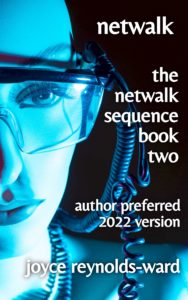Working on the revisions of my first published book, Netwalk, has really slammed home the degree to which format has shaped changes in my writing style. When I wrote the original Netwalk, my reading experience was primarily hard copy works, not online, reading apps, phone, or tablet.
This wasn’t something I noticed as much when working on Life in the Shadows, in part because much of that work was composed after the first publication of Netwalk, after I had more experience and observation of electronic publication. But the process of revising Netwalk, especially going back to it after working on some Kindle Vella episodes, definitely shows an evolving difference in style, especially when it comes to paragraphing. Hard copy only Joyce wrote in big paragraphs, big blocks of sentences. Electronic Joyce breaks up the paragraphs and structures them so the shorter paragraph length flows better–which requires some work in the final edited versions.
Why?
A very simple reason. When reading ebooks–and that is my primary form of reading these days, ever since I acquired an iPad early in the pandemic and started reading library ebooks–I found that looking at a paragraph that filled the entire screen was daunting. Visually tiring. If I ran into several screens with no paragraphing, I groaned and flipped through them, thereby missing a lot of what was most likely juicy and good stuff.
It’s also pretty darn telling when I put the work into Vellum for final formatting and production. The acquisition of that piece of book production software really helped me see how things looked on ereaders, and brought the realization home to me that I need to do something different. So–modify my style.
This change required some thinking about sentence and paragraph structure and organization. Because I’m somewhat ADHD, I often tend to veer into a lot of parenthetical diversions within sentences and paragraphs. They can be fun, but they can also be confusing for a reader. When I did the first revision of Netwalk Author Preferred 2022 Version, before sending it off to the editor, I started the process of paragraph and sentence reorganization.
(Note: this parenthetical usage is an observed behavior amongst ADHD-er writers. This Reddit has some interesting observations. I–uh–feel VERY seen when I read it.)
Fixing this does require a bit more editing work, especially since I apparently was overambitious in cutting some things out. The Martiniere works are where I really started paying attention to the paragraph and sentence flow, looking for ways to modify the parentheticals into something that isn’t quite as clunky and chonky. It’s a lot easier to do in initial drafting than it is now, with that early first work. Part of that is because the new work is part of my current writing process, whereas I’m trying to update my old writing style as well as update the tech in that first work.
On the other hand, I can be dispassionate about revisions because of all the years between that original drafting and this version. Working on Life in the Shadows also helped me refine the central conflicts within the series arc. This time around, I know where I’m ending up. Where the character arcs need to go. This is also as much a series continuity edit and revision as it is anything else.
Some may grumble “why do you feel like you need to modify your style for electronic readership? I won’t do that and I don’t see why anyone else should. Be true to yourself!”
Because a writer’s style can and should evolve as they grow and expand as a writer. Because I want to remain relevant to my readers as long as I can. Because I see electronic publishing becoming more and more important as years go by, which means not only tweaking my style to fit these newer mediums, but learning more about them and trying them out. Sure, I may groan about trying to suss out still another platform, another way of doing things.
Being true to myself means a commitment to keep on learning and developing, until it is no longer possible. As long as what I write is still my voice, then as far as I’m concerned, it works. I’m here to tell stories and engage readers. Not clutch desperately to outmoded stylistic methodology. I just need to figure out how to make it work in this format.
After all, before Mary O’Hara wrote the My Friend Flicka trilogy, she was a script doctor for silent movies*. She had to think in concise, precise phrases in order to convey dialogue and exposition. But when you look at her novels, she composes sprawling, vast, lush prose with metaphysical digressions. She changed her style to fit her format.
Certainly I can do the same sort of thing.
*Source: Flicka’s Friend: The Autobiography of Mary O’Hara. I bought this book many years ago and don’t regret it one whit.

